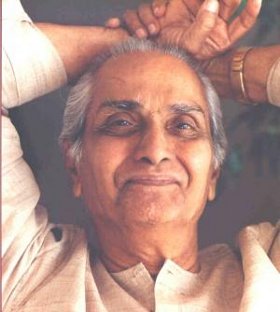What is seeking? Seeking is “you” wanting to know God.
All there is is consciousness. That is the Source from which the manifestation has come.
The thinking mind, the ego, the “me” are all the same. They are different names for the same thing, which is an illusion.
The only truth is I AM – I Exist. That is the only truth. Everything else is a concept. Rebirth is a concept. Your karma is a concept.
Enlightenment is total emptiness of mind. There is nothing you can do to get it. Any effort you make can only be an obstruction to it.
Life
Birth: Ramesh S. Balsekar was born on May 25, 1917 in Mumbai, India.
Realization: During his early life, Ramesh always felt he was enacting some role in a play that must, and would, end soon. Deep within, he believed that there had to be more to life than merely getting ahead of the other man. The answer came soon after his retirement when he had an encounter, which soon led to daily meetings, with the well-known sage, and his Guru, Sri Nisargadatta Maharaj. For Ramesh the total understanding that ‘no one does anything’ happened in 1979.
Death: Ramesh S. Balsekar on died September 27, 2009.
Teaching Style: Ramesh S. Balsekar began translating most of the daily talks held by Nisargadatta Maharaj. He himself began teaching in 1982. The ‘command’ to talk was given by his Guru, he says. He began his talks or ‘conversations’ with smaller groups and gradually, the number of visitors who came to listen to Ramesh began to grow. Since then, he has written many books and held several seminars in Europe and the USA. He continued to give discourse and answer questions in his Mumbai home until shortly before his death.
Fame: Ramesh S. Balsekar was a disciple of the late Sri Nisargadatta Maharaj, a renowned Advaita master. From early childhood, Balsekar was drawn to Advaita, a nondual teaching, particularly the teachings of Ramana Maharshi and Wei Wu Wei. He wrote more than 20 books, was president of the Bank of India, and received guests daily in his home in Mumbai until shortly before his death.
Legacy: He elaborates his own concepts with those of his Guru Nisargadatta Maharaj, the Buddha, Ramana Maharshi, selected Hindu scriptures as well as the teachings of Taoist Masters and Wei Wu Wei. All serve as pointers to the Truth – The Ultimate Understanding. The ‘command’ to talk was given by his Guru.
Teachings
Ramesh S. Balsekar taught from the tradition of Advaita Vedanta nondualism. His teaching begins with the idea of an ultimate Source, Brahman, from which creation arises. Once creation has arisen, the world and life operate mechanistically according to both Divine and natural laws. While people believe that they are actually doing things and making choices, free will is in fact an illusion. All that happens is caused by this one source, and the actual identity of this source is pure Consciousness, which is incapable of choosing or doing.
This false identity which revolves around the idea that “I am the body” or “I am the doer” keeps one from seeing that one’s actual identity is free Consciousness. Like other Vedanta teachers, he says that while creation and creator appear to be different and separate, that they are actually two sides of the same coin.
Balsekar taught that life is a happening but there is no individual doer of life.
He told that “Enlightenment is the annihilation of the “one” who “wants” enlightenment. If there is enlightenment – which can only happen because it is the will of God – then it means the “one” who had earlier wanted enlightenment has been annihilated. So no “one” can achieve enlightenment and therefore no “one” can enjoy enlightenment.”
According to him “Even the surrendering is not in your control. Why? Because so long as there is an individual who says “I surrender” there is a surrenderer, an individual ego… What he is saying is that even the surrendering is not in [your] hands.”
He told that “Where is the “me”? The “me” is always associated with the body and the body as seen through the microscope is nothing but a play of cells being created and destroyed.”
According to him “Truth or Reality is itself a concept. When you are in the truth or in deep sleep, which is only a pale reflection of the real, in that state of deep sleep is the Truth. And in that Truth there is no experience. In the waking state, the state of deep sleep is a concept. In deep sleep it is the Truth. But the moment you think of Reality, the moment you think Subject, the moment you think of the Absolute, the moment you think of the Truth, it is a concept. It is only when the thinking totally stops that Truth exists.”
He told that “All there is, is Consciousness. And the mind is merely a reflection of that Consciousness.”

